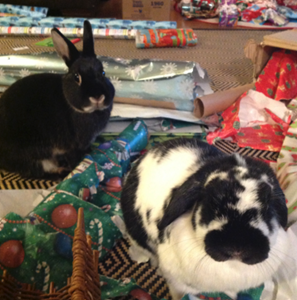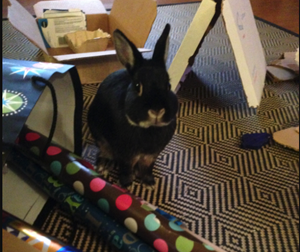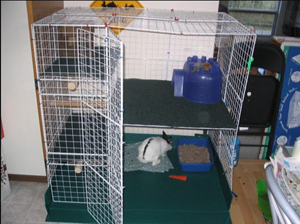I have had the privilege to live with rabbits in my house for over 25 years. They are much different than a dog or cat but still a very enjoyable pet. Rabbits are quiet and very clean animals. One major difference between dogs or cats is that they are prey animals. This means in the wild they would be hunted for food by predators. Because of this, they are extremely cautious animals. Even living in a calm predator-free house, they still get scared by loud noises and do not like sudden moments or in general being swooped in and picked up.
Once a rabbit settles into their home and realizes it is safe, they quite enjoy human companionship. One thing they really love is routine! My rabbits know the sound of the refrigerator drawer in the morning and beg for their treatment of broccoli or banana! I find rabbits to be quite sedentary during the day but love to run around and be curious in the evening.
I have always had an enclosure for my rabbits and I have experimented over the years at making them bigger and better. Closet organizer grids fastened with zip ties seem to work the best. I find an enclosure gives them their own safe space and I can be assured when I am not at home that they are not getting into anything. They are let out at night for many hours to run around and interact with us. They are easily litter box trained and rarely make poop outside their cage. Some people will let their rabbits have free run of their home. This takes a bit more diligent ” bunny proofing” as rabbits will chew on anything—cords, baseboards, rugs, wood etc.
One important aspect of caring for rabbits is their diet. If you take time to get this right, then many of their potential health problems will be eliminated. Rabbits need FIBRE in their diet. Their intestinal tract and their teeth depend on that. Unlimited timothy hay or orchard grass hay (NOT alfalfa) should be offered. A LIMITED amount of a pelleted diet may be given. No more than ¼ cup of pellets per 5 lb weight of rabbit. It is best to use a high-quality timothy hay pellet with no seeds or corn mixed in. A good brand of pellets is Oxbow. Offering too many pellets can cause obesity and prevents them from being hungry enough to eat hay throughout the day. Therefore their intestinal tract and teeth can become unhealthy over time. I also feed fresh veggies every day. Approximately 1-2 cups of leafy greens. Fruit should be limited to only small amounts daily as it is high in sugar. That means no more than one slice of banana no matter how much they beg!!
Check out the website. This site has more detailed information about diet including a large list of safe vegetables to feed. It is also a great source of information for all other things about rabbits. I find the best way to interact with rabbits is on the floor. Rabbits will tolerate being held but it is often too scary for them because it is similar to a predator attacking them when they are held in your arms especially while you are standing.
On the floor, they will come to you to be petted, for treats and to nudge your toe and check you out. In general, they love to know what you are doing. I often have a rabbit helping me do my stretching on the floor or wrapping presents or sweeping up. They are naturally curious and when happy they will jump straight up in the air and kick out their feet in a little bunny dance that some people call a “binky”. Then you know you have a happy house rabbit!
Another important thing to know about rabbits is that they like to HIDE any signs of illness. This comes again from being prey. If they show any weakness, then the will likely be eaten! As a pet owner (and as a veterinarian), it becomes difficult to assess that they are sick until diseases are quite advanced. This is why it important for you to get to know your rabbits and their habits. This way when anything is not quite right at all, it is worth getting checked out. I also try to weigh my rabbits at home every 3-4 months and this can be a good way of seeing if there are any early changes going on. Like any animal, the earlier you address an illness the more options you have for treatment and recovery.
Rabbits can LIVE for 7-10 years on average. Smaller rabbits can live up to 12 years. It is very hard to resist the appeal of that wriggling nose and cute little hopper as a family member.
Here are some pictures of my fur family:



Written by Dr. Jessica Wilson, DVM